Burt Britton, a Book Lover if Ever There Was One, Dies at 84

By James Barron
In the 1970s, a rope stretched across an aisle amid the stacks of books that climbed like stalagmites from the basement floor of the Strand Bookstore in Manhattan. Whether it was there to keep the customers out, or a certain employee in, remains unclear.
That employee was Burt Britton. If he did venture outside the rope, he was capable of endlessly “discoursing, more or less simultaneously, on every book in the place,” as the critic Anatole Broyard wrote in 1976. For years before he was hired, Mr. Britton had spent his days there as a customer, browsing and reading.
Mr. Britton, who was 84 when he died on July 21 at his apartment in Manhattan, went on to become a partner in another bookstore and was a collector of celebrity self-portraits, along with a mass of books of his own. He was also the kind of idiosyncratic New York personality who was not a household name but influenced the influential.
A cousin, Sue Saperstein, said the cause was a heart attack. There were no immediate survivors. He married, divorced and later remarried Korby Britton, who managed a dress shop on West 57th Street in the 1960s and later ran an antiques business with Julie Belafonte, Harry Belafonte’s second wife. Ms. Britton died in 2016.
At the Strand, Mr. Britton told well-known customers (and everyone else) what they ought to be reading. It helped that he had an encyclopedic memory and always seemed to know what pile a sought-after book was in, even if it was on the bottom.
Mr. Britton could be charming, persuading authors to sketch self-portraits or recounting a night at Studio 54 with Margaret Trudeau. But he could also be irascible and sharply opinionated, and he could sound supremely self-confident.
“There is no doubt in my mind that I am the greatest reader alive,” he once declared, “at least in fiction.”
He had “a corner-of-the-mouth whisper that goes into a shout without preamble or warning,” the author Morris Lurie wrote in a 1977 book whose title Mr. Lurie shortened to “About Burt Britton, etc.” (It dealt with writers he admired and had met, among them John Cheever, Isaac Bashevis Singer and Kurt Vonnegut.) Mr. Lurie said Mr. Britton looked “more like a hard-line negotiator for a tough union” than someone who worked in a bookstore.

Mr. Britton was born Burton Saperstein on Nov. 27, 1933, in Brooklyn. His parents, Al Saperstein and Doris Bergman, together owned or worked in restaurants on the Lower East Side. At some unspecified point he adopted the name Burt Britton.
Mr. Britton was not much of a reader when he was growing up in Canarsie; when he served in the Marines in the 1950s, rising to the rank of sergeant; or when he tried acting. He later explained his career turnabout to Mr. Lurie by saying that he had followed the Brooklyn Dodgers when the team moved to Los Angeles after the 1957 season.
But acting wasn’t working out. “I was George C. Scott when they wanted Tab Hunter,” he told Mr. Lurie. “That was me in Hollywood.”
Then one day he happened to pick up “The Hamlet,” the first of William Faulkner’s sprawling novels about the Snopes family. “I read 30 pages and said, ‘My God!’ ” he recalled.

Discovering reading changed his life — literally. “I drove a cab and bartended nights so I could live in bookstores,” he said.
And so he became a regular at the Strand. “Finally Ben Bass and his son, Fred, who are the owners, said to me, ‘Why don’t you come to work for us? You spend all your time here anyhow,’ ” Mr. Britton said later. “So I did.” (Benjamin Bass, the founder, died in 1978; Fred Bass, who transformed the store into the vast emporium it is today, at 12th Street and Broadway, died on Jan. 3.)
Mr. Britton left after 10 years, in 1978, to start Books & Company with Jeannette Watson. It was on Madison Avenue at East 74th Street, just south of what was then the Whitney Museum. “I wanted it to be like an English saloon or a French bookshop,” he said at the time.
He parted ways with Ms. Watson after a year in business. “We did quite well financially our first year, but he spent twice as much as we made,” Ms. Watson said in an interview, “and books were piling up.” Mr. Britton went on to manage a hamburger restaurant briefly, acquaintances said. Ms. Watson ran Books & Company until it closed in 1997.

As he had done at The Strand, Mr. Britton also urged his favorites on customers after eyeing the titles they had chosen, handing them one he liked better and saying, “It’s just as easy to read something good — why don’t you read this book?”
“So sometimes people who only read romance novels would end up reading Balzac,” Ms. Watson said.
Mr. Britton not only knew dozens of authors; he was also one himself, with one title to his credit, “Self-Portrait: Book People Picture Themselves.” It was a volume of more than 500 sketches that Mr. Britton had collected from well-known writers, artists and musicians. It was published in 1976. Many of the sketches were auctioned off in 2009.
The seed for the book was planted one night at the Village Vanguard, the jazz club where Mr. Britton was substituting for the bartender and looking to close up for the night. One boozy customer remained.
“He kept asking, ‘What do you want from me, kid?’ ” Mr. Britton recalled in 2009.
Finally, Mr. Britton pushed a piece of paper across the bar and told the man, “Do a self-portrait for me, drink your drink and let’s call it a night.”
Norman Mailer complied.
Mr. Britton, who commissioned many of the sketches at the Strand when he encountered renowned customers, said the writer Lillian Hellman had captioned her self-portrait “What I wanted to look like and don’t.” By her hair she wrote, “blonde curls, natural,” and by her eyes, “deep blue eyes, natural.”
“First thing I thought was, she wanted to look like Jane Fonda,” Mr. Britton said. “I pick up the phone and I call her. I said: ‘I know the feeling. I want to look like Alan Ladd.’ It wasn’t even a lie. I did.”
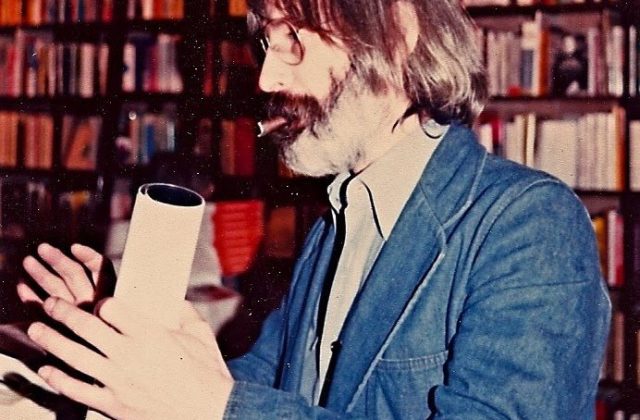
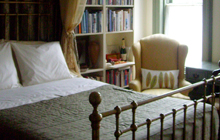 Jumel Terrace B&B
Jumel Terrace B&B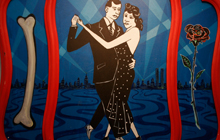 Life Turns Man Up & Down
Life Turns Man Up & Down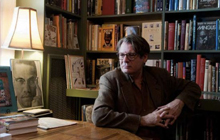 The Private Library
The Private Library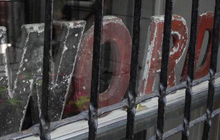
what a lovely pair of “obits” Mr K. Your memories are filled with the glue that holds these ever smaller threads of the book community together. Thanks for taking the time to write this companion.